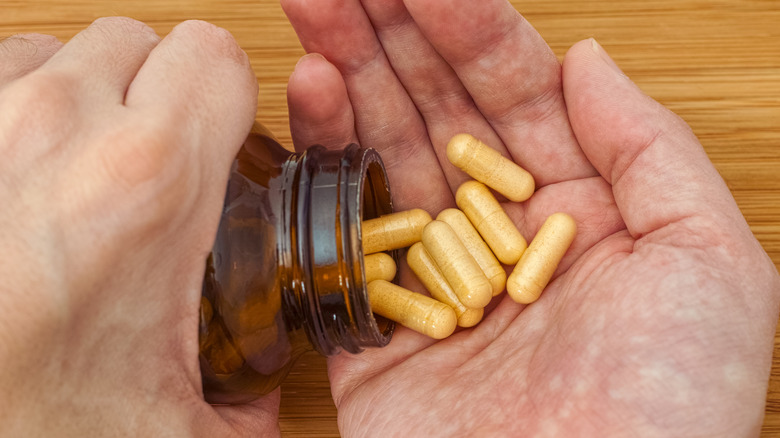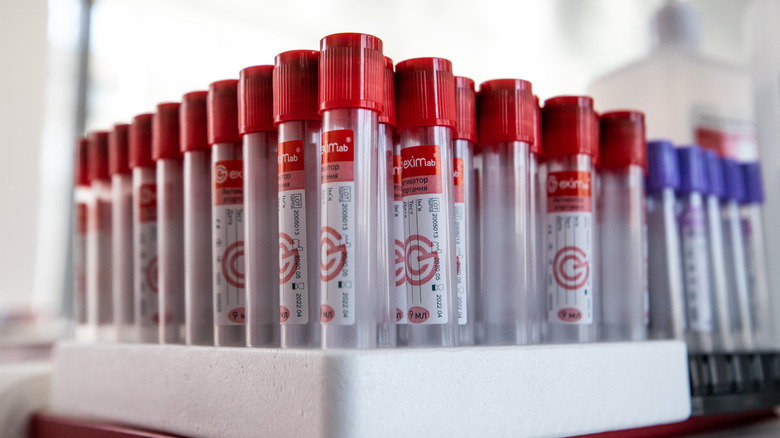The Hidden Side Effects Of Too Much Vitamin B12
Vitamin B12 is one of eight B vitamins, all of which are essential to human health and well-being, but none of which are manufactured by the human body in adequate supply and must therefore be consumed in food or supplemented in some form (via St. Luke's Health). Almost every natural food source of vitamin B12 is animal-based, according to the NIH Office of Dietary Supplements (ODS). However, many foods are fortified with vitamin B12, per Harvard T.H. Chan School of Public Health. And supplements are available both over the counter and by prescription, including via injection.
Vitamin B12 is required for DNA and red blood cell production. Because of the latter, symptoms of vitamin B deficiency almost always include fatigue. Vitamin B12 is also essential to brain and nerve function. So, deficiency symptoms may also include depression, cognitive issues, difficulty balancing, and tingling in the appendages — all nerve and/or brain related. The consequences of long-term vitamin B12 deficiency include permanent damage to the nervous system.
Fortunately, vitamin B12 deficiency is rare, according to Cleveland Clinic, as the body doesn't need much. For most people, it can take literally years of inadequate vitamin B intake before deficiency symptoms even start to appear. That's because a normal functioning human body stores between 1,000% and 2,000% of their vitamin B12 RDA (via Merck Manuals Consumer Version and ODS). Of course, that begs the question: can you take too much vitamin B12? Moreover, what are the side effects if you do?
Why most people get enough vitamin B12 from diet alone
The RDA for vitamin B12 is so small that it's measured in thousandths of a milligram, which is expressed as either mcg or ug (a millionth of a gram). Specifically, for most adults and teens, the RDA is 2.4 mcg/ug, according to Harvard's School of Public Health. That's available in just three ounces of sockeye salmon, per vitamin manufacturer Centrum, or a three-ounce lean beef hamburger, per SF Gate.
The RDA for pregnant people is slightly higher (2.6 mcg), according to BabyCenter. This is because the fetus needs vitamin B12 to develop normally, and those needs are met through placental absorption. A 2004 study published in the American Journal of Obstetrics and Gynecology suggests vitamin B12 deficiency during pregnancy may increase spina bifida risk in the fetus/baby. During lactation, the RDA is a bit higher (2.8 mcg), per the CDC, reflecting that a baby's B12 requirements increase rapidly. It also reflects that pregnancy has the effect of leaving one depleted of their vitamin B12 stores, according to Village Pharmacy of Hampstead.
Nevertheless, vitamin B12 deficiency is rare, occurring in anywhere from 1.5% to 15% of people, according to Cleveland Clinic. There are exceptions, however.
Vitamin B12 supplementation is important in discrete populations
People who don't consume animal flesh run the risk of vitamin B12 deficiency — that is, unless they take supplements or regularly eat foods fortified with the nutrient, including fortified cereals, fortified plant milks, and fortified nutritional yeast, according to The Vegetarian Resource Group. This is especially true in people who don't consume animal flesh who are also either pregnant or lactating, per Harvard's School of Public Health and Village Pharmacy of Hampstead.
In addition, those who take certain medications may be at increased risk for B12 deficiency, per Healthline. These medications include proton pump inhibitors (which are sometimes prescribed for people with GERD), the gout medication colchicine, the diabetes drug metformin, and H2 blockers such as Pepcid. In addition, large doses of vitamin C may deplete vitamin B12 stores in the body, per HSIS. The same may be true of folic acid, which is commonly taken in supplement form during pregnancy, per a 2022 study published in Advances in Nutrition.
Others at risk include those over the age of 60, according to a 2021 study published in Nutrients. The reason is that the body becomes less efficient at absorbing B12 after age 60. Further, the elderly population is, as a statistical matter, at higher risk of malnutrition, as compared with younger adults. So too are those dealing with ongoing food insecurity. For all populations at risk for vitamin B12 deficiency, B12 supplementation can be critical to optimal health and well-being.
Still, some populations should be cautious with vitamin B12 supplementation
Taking a daily multivitamin is generally considered a safe route to ensuring adequate vitamin B12 intake for most individuals; most multivitamins deliver doses ranging from 5 to 25 micrograms, which equals between two times and 10 times the RDA (via ODS). The same is true of B vitamin complex supplements, which deliver 50 to 500 micrograms (i.e., 20 to 200% of the RDA), as well as for most supplements containing only vitamin B12, which deliver up to 1,000 micrograms (about 400% of the RDA). These amounts are considered safe because the human body, as a general matter, can safely store from 1,000 to 2,000 times the RDA, without negative consequence (anything more will generally be excreted in urine, per NCBI Bookshelf). There are notable exceptions, however.
People with diminished kidney function may have difficulty processing and excreting doses of vitamin B12 in excess of 400 micrograms per day, according to registered dietitian Reed Mangels (via Vegan Health). Others who may not be able to tolerate dosages of vitamin B12 that are higher than what is found in most multivitamins include people who have been diagnosed with low potassium, Leber's vision loss, or atrophic gastritis, according to WebMD. In addition, a 2019 study published in JAMA Network Open suggests that post-menopausal women who habitually take high doses of vitamin B12, especially if they're also taking high doses of vitamin B6, are at higher risk of hip fracture.
Although vitamin B12 is essential during pregnancy, too much can harm the fetus
Vitamin B12 deficiency is associated with negative pregnancy outcomes, according to a 2021 review of then-existing scientific literature on B12 deficiency in the Indian population (via Frontiers in Endocrinology). Such outcomes may include babies with low birth weight, pre-term labor and birth, as well as other pregnancy complications. In addition, Healthline points out that B12 deficiency during pregnancy may be associated with a higher risk of spina bifida, not to mention other neuro/spinal conditions. According to a 2018 study published in Paediatric and Perinatal Epidemiology, moderate B12 supplementation may reduce the risk of having a child born with autism spectrum disorder (ASD).
However, at higher doses and with more frequent dosing, the risk of having a child born with ASD may actually increase, per that same study. Moreover, according to 2016 research out of Johns Hopkins University, the risk of giving birth to a baby who later develops ASD is three times higher in those with "very high" blood serum B12 levels. If levels of both B12 and B9 (folic acid, or folate) are "extremely high," the risk increases by more than 17-fold. That being said, neither study specifically states how much one must take of vitamin B12 (or folate) for their blood serum levels to register as either "very high" or "extremely high." For that reason, although vitamin B12 (and folate) supplementation are important during pregnancy, it's best to look to your healthcare provider for guidance.
Too much vitamin B12 may also cause or exacerbate acne
Vitamin B12 is a "water-soluble vitamin," according to Rachel Feaster, PharmD (via GoodRX). This generally means that excess amounts are excreted in the urine, rather than being stored in the body, per NCI Dictionary of Cancer Terms. However, "unlike most other vitamins, B12 is stored in substantial amounts, mainly in the liver, until it is needed by the body," according to Merck Manuals Consumer Version. That's one reason taking too much vitamin B12 can be problematic in some populations. But too much vitamin B12 can also lead to less serious side effects.
Specifically, taking too much B12 has been linked to acne, according to a 2013 case study published in Cutaneous and Ocular Toxicology. Further evidence of that link can be found in a 2015 study published in the journal Science Translational Medicine. In the latter study, the researchers hypothesized that vitamin B12 may activate an inflammatory process in bacteria that normally lives on the skin, but which can promote acne when inflamed, according to Live Science.
In both studies, the mode of supplementation was via injection, which tends to involve high doses of vitamin B12, although precise dosages were not specified. Nevertheless, one doctor not affiliated with the research observed that there is not yet enough evidence to conclude that people with or at risk for acne should go out of their way to avoid eating foods rich in vitamin B (via Live Science).
Taking too much vitamin B may also cause other minor side effects
When consumed in food in which vitamin B12 either naturally occurs or in which vitamin B12 has been fortified under the guidance and purview of the U.S. Food and Drug Administration (e.g., fortified plant milks, cereals, and nutritional yeast), vitamin B12 does not appear to be associated with adverse health consequences — or even minor side effects. The same is true when taken as directed in the form of multivitamin supplementation, or any supplementation that contains no more than 5 to 25 micrograms per dose (via ODS).
But serious health problems can arise for some individuals taking vitamin B12 at higher dosages. Further, as Healthline points out, injectable B12 — which is generally given in much higher dosages than what can be found in food and multivitamins — has been associated with more commonplace side effects, minor as they may be.
Side effects of injectable B12 may include such gastrointestinal symptoms as nausea, vomiting, mild diarrhea, headache and dizziness, skin rash, and itching (presumably, related to skin rash). That being said, some people who have taken injectable vitamin B12 have complained of difficulty walking and balancing, nervousness, anxiety, weakness, lack of coordination, and even a sensation of pins and needles, per SFGate. In addition, some have experienced localized pain and redness at the injection site. In rare cases, large doses of vitamin B12 may cause a serious allergic reaction.
Can too much vitamin B cause cardiovascular problems?
Taking too much vitamin B12 may cause certain potentially serious cardiovascular complications, according to Healthline. However, it would appear this is the case only in one very specific circumstance: That is, when doctor-prescribed vitamin B-12 is administered to treat pernicious anemia (via Pernicious Anemia Relief). Pernicious anemia is a shortage of red blood cells that develops as a result of vitamin B12 deficiency. The vitamin B12 deficiency involved in pernicious anemia is not brought on by inadequate diet, but rather by a relatively rare condition that inhibits the absorption of vitamin B12 in the gut, per MedlinePlus Medical Encyclopedia.
Pernicious anemia, which rarely shows up before age 60, is treated with prescription strength vitamin B12. The thing is, however, when pernicious anemia responds well to treatment, the immediate effect is an increase in red blood cells, according to PA Relief. This can lead to low potassium levels and high platelet count, which can, in turn, cause an irregular heartbeat and/or hypertension. Increasing potassium intake under your doctor's guidance may help.
In the general population, vitamin B supplementation may even be associated with a decrease in blood levels of homocysteine, a compound linked to heart attack and stroke risk, according to ODS. However, studies have not yet demonstrated that vitamin B12 supplementation can reduce heart attack or stroke risk.
Can too much vitamin B12 cause blood cancer?
Healthline notes that another side effect of too much vitamin B12 is the development of a rare and slow-growing blood cancer known as "polycythemia vera" (PV). However, it's not entirely clear whether high vitamin B12 blood levels cause PV or the PV disease process may result in high blood levels of vitamin B12.
In support of the former, Livestrong explains that the PV disease process begins in the bone marrow, leading to the overproduction of red blood cells. Since vitamin B12 supports red blood cell production (via ODS), it is conceivable that when a vitamin B12 deficiency is treated with high dosage supplementation, the result may be the overproduction of red blood cells. PV is characterized by the overproduction of red blood cells.
Nevertheless, an elevated red blood cell count does not necessarily lead to a diagnosis of PV, according to Mayo Clinic, which identifies other conditions a high count might point to. Moreover, Pernicious Anemia Relief offers the possibility that the PV disease process may cause the liver to release stored vitamin B12 into the bloodstream. This would tend to lead to higher vitamin B12 blood levels, even in people being treated for pernicious anemia. However, it does not mean that the B12 supplementation caused the PV to occur. Rather, PV and pernicious anemia may coexist, as Livestrong suggests.
How B-12 supplementation may lead to headaches, both literal and figurative
If you take too much vitamin B12, you may be setting yourself up for a figurative headache — one involving extensive medical testing and related anxiety and financial damage. It's because elevated B12 levels on a lab test tend to be regarded by healthcare providers with concern. Hematologic disorders like chronic myelogeneous leukemia, promyelocytic leukemia, polycythemia vera, and hypereosinophilic syndrome can present as elevated serum blood levels of vitamin B12, which is also known clinically as serum cobalamin, note the authors of a 2013 research review published in the journal Clinical Biochemistry.
Nor is the worry necessarily limited to potential blood disorders. "Several liver diseases like acute hepatitis, cirrhosis, hepatocellular carcinoma and metastatic liver disease can also be accompanied by an increase in circulating cobalamin," according to the aforementioned researchers. It certainly makes sense when you consider that vitamin B12 is stored in the liver at amounts that can sustain one's life for several years without any dietary or other sources, per ODS.
In any case, lab results that indicate elevated levels of vitamin B12 in the blood will almost inevitably lead to a phone call from your doctor. Although your doctor may put aside their concerns if/when you explain that you have been supplementing with vitamin B12, it's not outside the realm of reason that your doctor may still want to bring you in to rule out serious illness.
Some people are allergic to vitamin B12
Vitamin B12 is made up of one atom of cobalt plus various other substituents — one of which is cyanide, albeit in such a minute amount as to have no toxicity at all, according to McGill University's Director of the Office for Science and Society, Dr. Joe Schwarcz (via McGill University). Of slightly greater concern, but to only a very few people, is the presence of the cobalt.
Cobalt is a metal (per American Council on Science and Health). Even though cobalt is a major component of an essential vitamin, about 2% of the general population is allergic to it, according to DermNetNZ. Cobalt allergy is associated with skin irritation, including rash, itchiness and redness, but in some cases, it may involve oozing and peeling (per ACSH). At its most serious, it can cause life-threatening anaphylaxis (per DermNetNZ).
However, the amount of cobalt found in edible vitamin B12 sources isn't high enough to cause a reaction, with rare exception. It's only when supplements come in that there is a risk. For people with cobalt allergy (which is more common among people with nickel allergy) who are also at risk of vitamin B12 deficiency, the "general advice seems to be 'take just enough but not too much,' which isn't too different from dosing advice for all vitamins and drugs" (via ACSH).
The only way to really know if you've taken too much vitamin B12
Apparently, there are, in fact, some things that can go wrong if you take too much vitamin B12, from a minor headache to a severe allergic reaction, depending on your own personal risk profile. On the other hand, there is no such thing as a vitamin B12 overdose, because there is no such thing as a maximum dose for vitamin B12, according to both Tufts University Health & Nutrition Letter and Harvard T.H. Chan School of Public Health. Both cite the Institute of Medicine — which has not established a "Tolerable Upper Intake Level" for vitamin B12, despite having done so for other nutrients – as their source.
So, which is it? It's both.
There is no documented case in medical history in which any individual literally overdosed on vitamin B12, let alone died from it. Nevertheless, taking vitamin B12 at high doses can cause minor side effects in almost anyone. In a limited number of people, any vitamin B12 supplementation at all comes with some level of risk. In others, the risk begins once a prescribed level has been exceeded. In most cases, you won't know you're taking too much vitamin B12 unless you have your blood levels tested in a lab. (And while you're at it, you might as well check in with your doctor to talk about which supplements, and in which dosages, you should be taking.)












